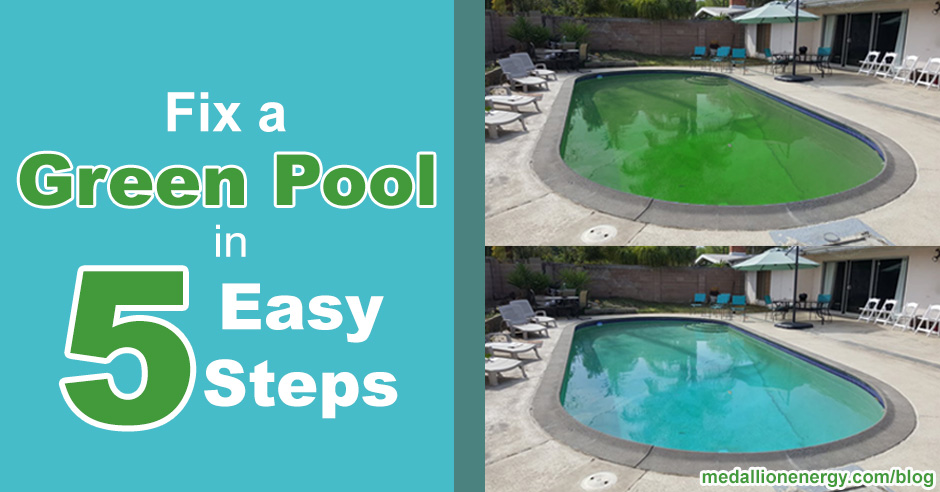Maybe you lifted up your winter cover to open your pool and were surprised by bright green water. Or maybe the algae crept up on you one faithful day during swim season.
Don’t worry. It happens to the best of pool owners. And luckily, there’s plenty you can do to win the battle against algae and reclaim your pool.
In this post, show you how to fix a green pool in just 5 steps. If you follow these steps, you can get rid of your pool algae problem in just a few days or less.
Here’s a quick summary of how to fix a green pool:
- Lower your swimming pool’s pH
- Shock the pool
- Add flocculant
- Vacuum the pool
- Add an algaecide
That’s the whole process right there, but you probably have a few questions now, like:
How much do I lower my pool’s pH?
How much shock do I need to kill pool algae?
How can I remove pool algae faster?
We answer all those questions and more in the next few paragraphs, so keep reading and let’s fix your green pool once and for all.
HOW TO FIX A GREEN POOL
Get Rid Of Pool Algae Fast
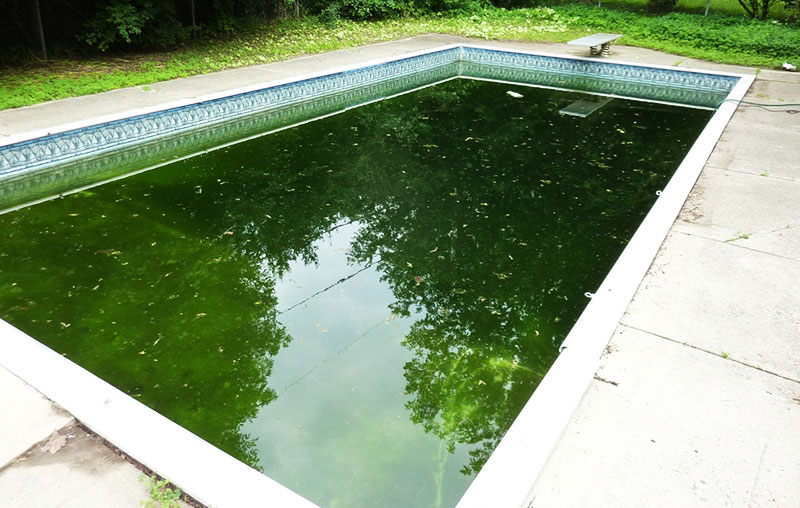


What you need
- pH Decreaser
- Pool Shock
- Flocculant
- Algaecide
Other tools that help:
- Pool vacuum
- Pool brush
Do this before you start:
- Test and balance the water
- Open up and check your filter
- If it’s clean, great. If not, clean it out.
- Scrub the pool as much as possible
- This loosens up a lot of the algae that’s clinging to the walls
Lower your pool’s pH
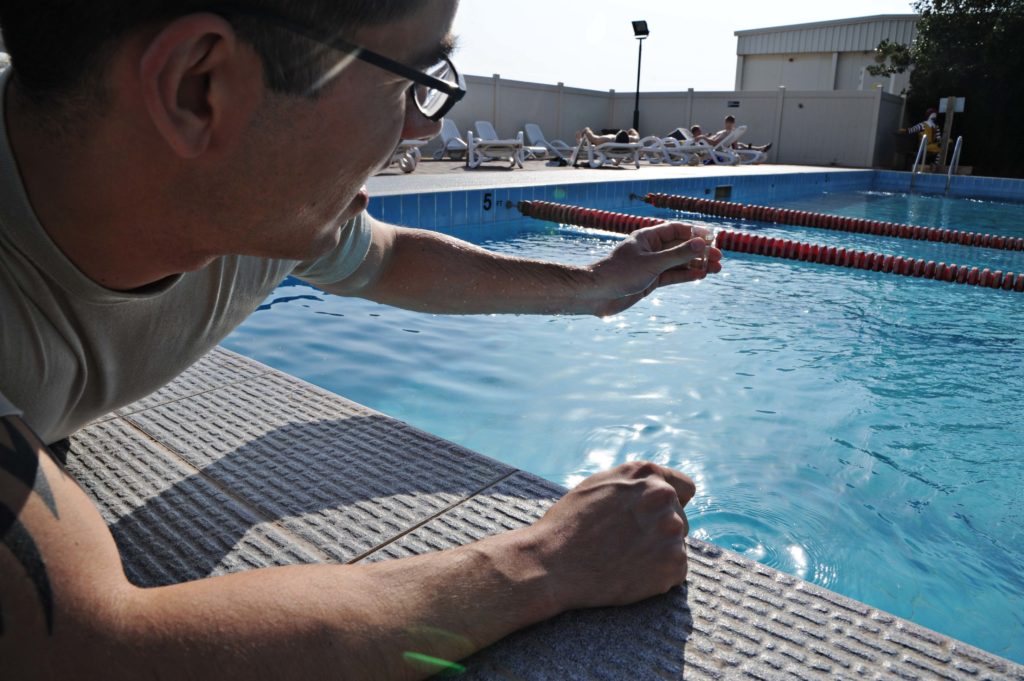


In order for pool algae to thrive your water’s pH has to be pretty high (7.6 and up). When your pH is low, or balanced, pool algae can’t repopulate.
Which is why lowering your water’s pH is the first step in getting rid of pool algae.
The most effective way to lower your pool’s pH is by using muriatic acid:
- Use about 1 quart per 10,000 gallons of water
- Wait a bit, then retest your pH.
- Aim for a pH between 7.2 and 7.4
IF you’re using a different pH decreaser product, follow the included manufacturer instructions on the packaging.
Once your pH is in the right range, it’s time to battle the algae.
Shock the pool to kill the algae
In order to destroy pool algae, you have to essentially drown it in pool shock. More accurately, a flurry of sanitizer, that disarms the algae and kills it at the root.
But you might be wondering:
How much pool shock do I need to get rid of pool algae?
That depends entirely on the color of the pool algae.
The 4 main colors of pool algae are:
Light green/teal, green, dark green, and black
Each one requires a different amount of shock to be defeated, with black algae being the strongest.
Here’s how much shock to use to remove pool algae:
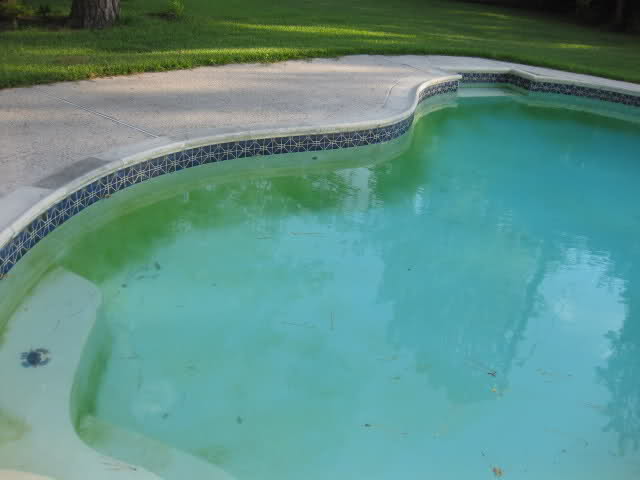


To remove light green/teal pool algae:
Use 1-2 bags of pool shock
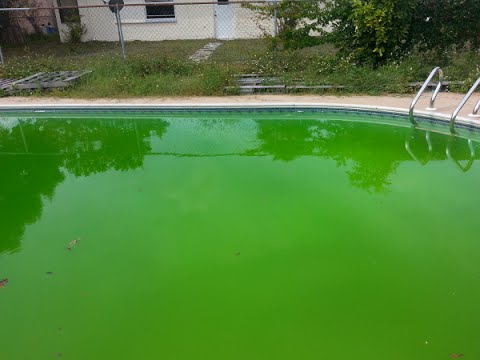


To remove green pool algae:
Use 2 bags of pool shock
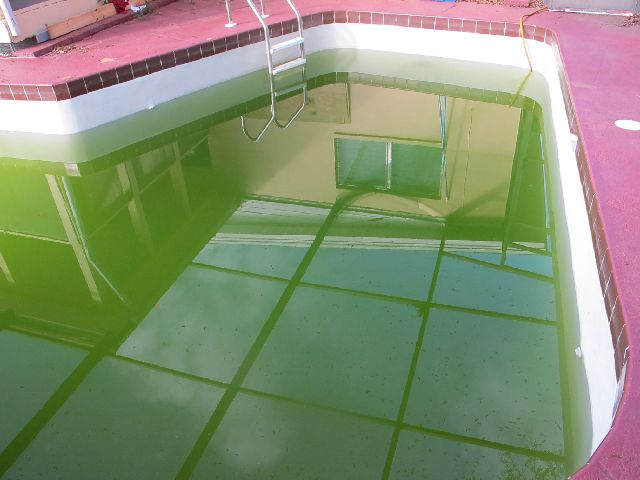


For dark green pool algae:
Use 3 bags of pool shocks
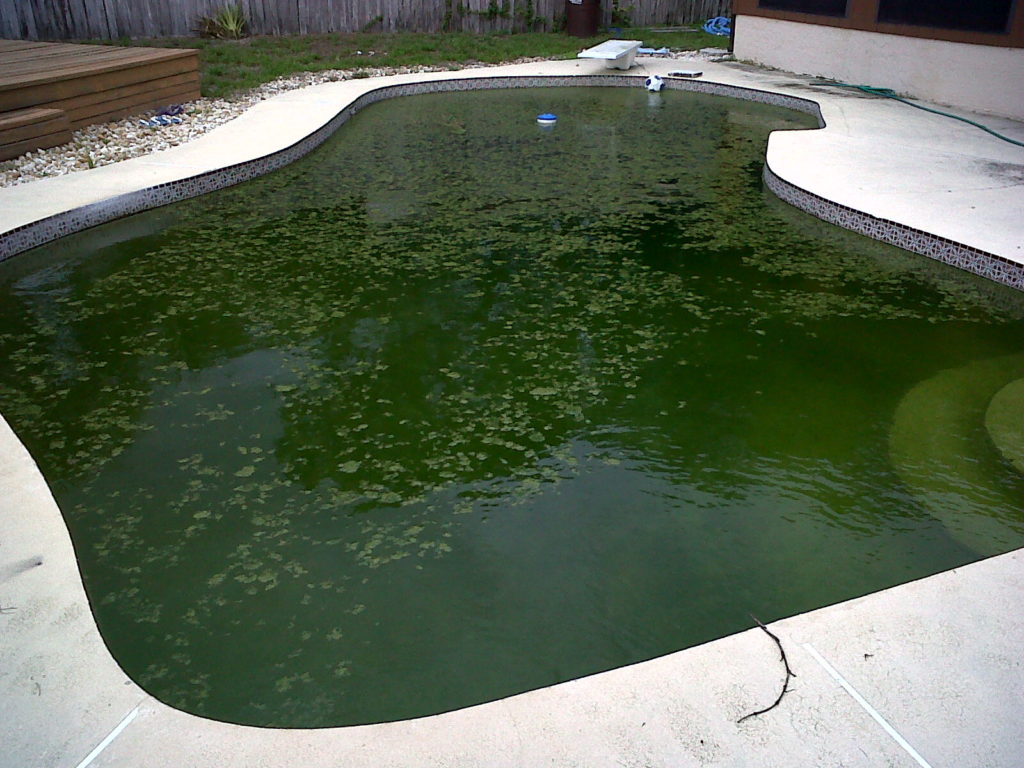


For black pool algae:
Use 4 bags of pool shock
After you’ve shocked the pool, give your filter system a few hours to circulate the chlorine. After that, it’s time to clean up the battleground.
Related: How To Shock Your Swimming Pool
Use flocculant to clear up the algae
You’ve disarmed the enemy (algae), but its presence still lingers.
The best way to clear out the rest of the pool algae is to use a pool flocculant.
Flocculants are normally used to clear up cloudy white swimming pools. They work by clumping particles together and sinking them to the bottom of your pool — making it easier for you to clean up and filter out.
Use 1 – 2 treatments of pool flocculant depending on the severity of the pool algae. After adding it to your pool, give the flocculant some time to settle in.
Once you see the algae sinking to the bottom, it’s time to finish the job.
Vacuum the pool
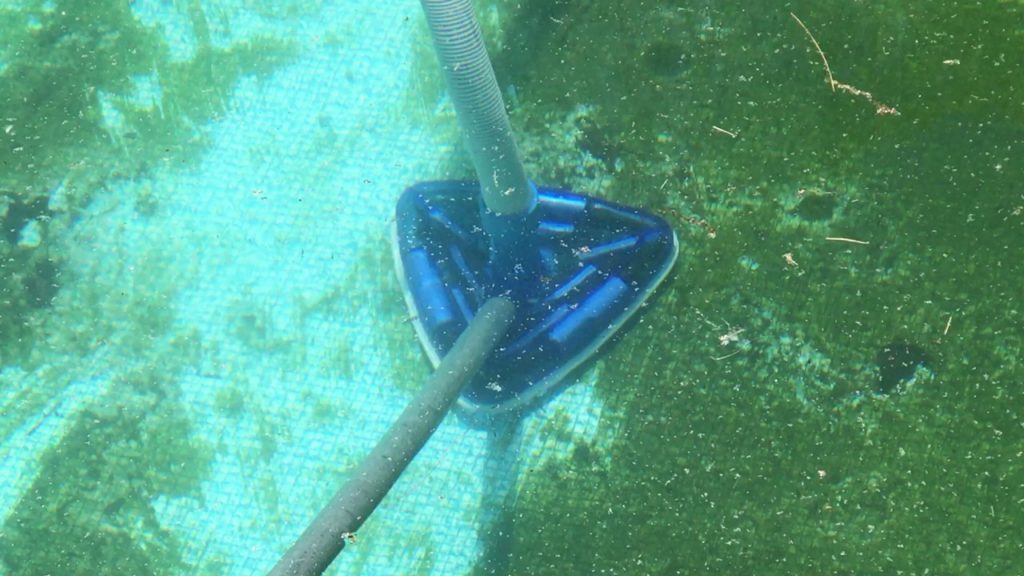


Grab your pool vacuum and begin vacuuming up and down your pool. The goal here is to suck up as much of the pool algae as possible.
You might not get it all, but you’ll get most of it. The rest will filter out over the next day.
Here’s how to vacuum a pool.
Add an algaecide to prevent future algae growth
Ahh, the algae are almost gone. Let’s make sure it leaves for good.
Finish off the job with an algaecide treatment to prevent any future algae growth from taking place.
From here, leave your filter running for the next 24-48 hours.
A few finishing touches to get rid of pool algae faster
While your pool filter will eventually clear up the pool by itself, there are a few things that you can do to speed up the process.
Vacuum again
While your earlier vacuuming may have helped clear up the water, it probably didn’t get everything.
So vacuum your pool a second time. This helps to capture the debris you might have missed the first time around.
Clean out the filter often
While your pool clears out the rest of the algae, it stores it in your filter. And it piles up fast.
This is why it’s important to clean out your filter several times while you’re getting rid of algae: its the best way to prevent buildup and keep the algae removal process going smoothly.
Retest your water every 12-24 hours
After spending all that time fixing your green pool, making sure your hard work pays off is important.
So keep testing your water every 12 hours to check if any adjustments are needed to get it in balance.
Related: How To Balance Your Water in 7 Easy Steps
Stopping pool algae from coming back
The number one tip for preventing pool algae is keeping your water balanced. Especially pH.
The better your water’s chemical balance, the harder it is for algae to take over.
Here are some tips for preventing pool algae:
- Balance and test your water regularly (3x per week)
- Avoid high pH — keep it in the 7.4 – 7.6 range
- Check and clean your filters twice a month
- Shock your pool once a week
- Keep up with pool maintenance
If you liked this post, you might also like:
- 7 Ways To Lower Your Swimming Pool Bills By Up To 50%
- 21 Pool Care Hacks That Make Pool Maintenance Easy
- 7 Secrets For Keeping Your Swimming Pool Crystal Clear

